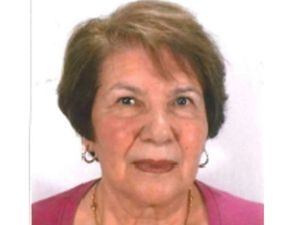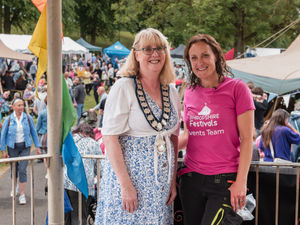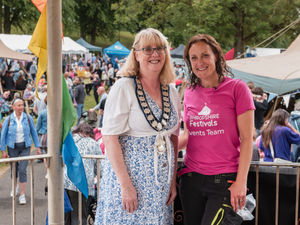Working with the animals
Shropshire's TV vet Steve Leonard talks about life, work and orangutans.
 A lucky break at university led Whitchurch vet Steve Leonard into a successful TV career.
A lucky break at university led Whitchurch vet Steve Leonard into a successful TV career.
When Steve Leonard is extracting the teeth of a mangy cat, or pumping anti-inflammatory drugs into an arthritic Yorkshire Terrier he has one thing on his mind: the telephone. The Whitchurch vet and sometime TV presenter is waiting for the call telling him where he'll be sent by the BBC.
"My life is 90 per cent vetting in Shropshire and 10 per cent flying off and doing TV programmes," he says. "I love both parts of my career and, of course, I find it very exhilarating to fly around the world."
Steve is part of Leonard Brothers Veterinary Centre, in Brownlow Street. His father was a vet, as are his brothers Den, Tom and Keith.
He says: "I got involved with the BBC during my time at Bristol. They came along to do a documentary on final year students. I thought it would be a laugh, so I volunteered. They followed a handful of people and it was broadcast on BBC1 primetime. We had no idea it would be as popular as it was. It went so well that they followed us out into practice and did Vets In Practice. That ran for 11 series. It was a very, very successful programme, which led me to do other work."
Steve enjoyed a second lucky break thanks to TV presenter Kate Humble who had been working as a researcher on The Holiday Programme, before making the breakthrough as a star in her own right. Humble approached Steve and Trude Mostue to go on safari for a week. During filming, his producer suggested they travel around Africa, working with wildlife vets.
Steve says: "Two months later, they phoned me up and said they wanted to do it. My jaw dropped. I was working in Lancashire and thankfully I had very understanding bosses who let me fly out to dart elephants and rhinos and herd giraffes."
Steve's career went into overdrive and his work caught the eye of famed natural history producer Martin Hughes-Games. "Martin's an absolute genius. He came up with this programme called Ultimate Killers. It was a complete change from anything that the BBC's Natural History unit had done before. We went away and did a shoot on piranhas, which made for a very funky, very fast cut programme. It just took off and it really got massive viewing figures compared to other output. It launched us into a position where they were wanting more of the same."
During the next year, Steve found himself covering 25,000 films in search of the world's best predators. He encountered venomous snakes, jellyfish, komodo dragons, lions, bears, polar bears and all manner of other creatures. He was chased by a cheetah, swam with great white sharks, was stung by killer bees and horribly mauled by a rabbit! On one occasion, he climbed into an eagle's nest in Panama, 120ft up a very wobbly tree. "It was just mind blowing," he says.
His next series was Extreme Animals and soon after he presented Animal Camera. "During the course of 10 or 13 years, I've travelled 150,000 miles and been to just about every continent on the planet. I've been exposed to animals that you could not pay to go and see.
"The thing that drives me with tv is the opportunity it gives you to visit new places. I'm not interested in being famous or recognised. I don't want exposure in tabloid papers and that sort of thing. I'm only interested in animals and their natural habitats. No other thing can compare with being in the water with a great white shark or going into an enclosure with lions."
Steve recently worked on the popular BBC series, Orangutan Diary and has spent plenty of time with the nation's greatest animal buff, Sir David Attenborough. He instantly dismisses the notion that he'd ever wish to challenge the father figure of natural history.
He says: "I think for a while, the BBC was still wondering what would happen when Sir David hangs up his boots. They were trailing various presenters but I think there isn't anybody who can step into his shoes. He is unique. I only regard two opinions outside those offered by my family: they are from the veterinary profession and Sir David.
"I've met him on a number of occasions and he is the perfect gentleman. He has a wealth of stories but is incredibly humble. Most people forget how much of a trailblazer he is. 50 years ago, what he was doing was unheard of."
Steve hopes his programmes will help people to become more aware of conservation issues. Welfare is at the heart of his work. He was proud that his Orangutan Diary programme helped save a charity - the Borneo Orangutan Survival Foundation - dedicated to their preservation.
"That programme is the most influential I've made. The charity had run out of money and was going under. Now it's future is assured."
Today, Steve is back home in Whitchurch, administering relief to the animals of Shropshire. He is passionate about what he does. "It's very important," he says. "This is a beautiful part of the world with great people. I'm very fortunate to be working here with friends and family."
But his passport is at the ready in the event of a phone call asking him to jet off to some far flung place.
By Andy Richardson



